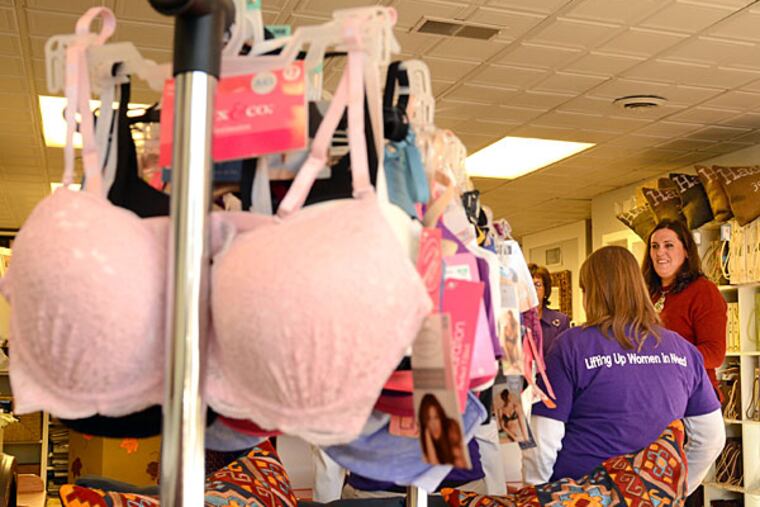Empowering homeless women with essentials
The homeless woman receiving the gently used business suit was very grateful, she told the social worker. But was there somewhere she could get a bra? She didn't own one.

The homeless woman receiving the gently used business suit was very grateful, she told the social worker. But was there somewhere she could get a bra? She didn't own one.
When Joanie Balderstone, who had donated the clothing, heard that, she knew she had to lift this woman up - in more ways than one.
"Apparently, it's a common occurrence," she said.
That was November 2009.
Four months later, Balderstone, 42, and her wife, Rebecca McIntire, 41, held their first Mardi Bra party, inviting all the women they knew. Guests brought 80 new bras and hundreds of feminine products that the couple delivered to shelters in Camden.
By March this year, their efforts became Distributing Dignity, a nonprofit that provides new bras and feminine products to women and girls living in homeless shelters. This broadened their outreach to facilities throughout South Jersey and the Philadelphia area, and aided an additional 400 women, 600 total since that first party.
Homeless shelters offer beds and meals, and some also hand out shampoo, toothbrushes, and soap for residents. Girls and women, though, require essentials that men do not - bras, pads, tampons, and panty liners. And despite the good efforts of shelter workers who try to garner these products, the women often have to make do or go without.
With their Cherry Hill living room filled with donations, Balderstone and McIntire have received about $2,000 in seed money, mostly used for administrative and operating costs.
"Since our first Mardi Bra party, the word has been spreading. We've received checks and packages in the mail," McIntire said. One anonymous donor a few months ago dropped off 20 designer bras purchased at Nordstrom.
Bridget McMullin, a childhood friend of Balderstone's who reconnected through Facebook two years ago, is hosting a reception Thursday evening at her Haddonfield studio, where admission is a new bra or feminine product. McMullin, 41, who owns the McMullin Design Group, also helped the pair develop a business plan and promotion strategy using social media. Balderstone, for her Nov. 3 birthday, wanted the gift of 1,000 Facebook likes on their page. She got it.
On a recent afternoon, lace, satin, and spandex bras in every shade hung on a clothing rack in McMullin's office. She was helping the couple sort through some of the latest donations.
"It doesn't get more personal than this," McMullin said. "It's something most women take for granted."
Executive director Connie Karasow has worked for 25 years at Libertae, a Bensalem residential treatment center for women recovering from drug, alcohol, and other social problems.
Her first delivery arrived from the couple in the spring. "What's really nice is that they give us the sizes we need for the women. We've gotten secondhand bras from other organizations, but there's nothing like a new one," she said. "It's more dignified."
In fact, that's what distinguishes their nonprofit from others. At first, contributors offered their old bras.
"People meant well," but Balderstone remembered something her late mother told her. "She said, 'Just because these people are homeless doesn't mean they don't deserve some dignity' " - which is the basis for the Distributing Dignity name. A graphic designer friend sketched the first D into the shape of a bra; purple is the signature color of domestic violence.
Jeey Moncayo is a caseworker for Camden County Women's Center, where more than a thousand women in 2013 found safety from abusive relationships. She said most women escape their abusers in a hurry, arriving with just the clothes they're wearing. For others, their abusers, in fits of rage, have burned or thrown bleach on their clothes.
Mothers spend any money they have on their kids first. "The women's needs come last," she said.
In June, the center received 150 bras from Distributing Dignity. The women especially liked the option of feminine pads marked narrow, slim, and tween. "It sounds silly," said Moncayo, "but the choice is empowering."
One 27-year-old, who fled from an abusive relationship in Florida, stands out in Moncayo's memory. After receiving a baby-blue Victoria's Secret bra, she told Moncayo, "I never thought I was allowed to wear something so beautiful."
Each bra is wrapped in white tissue paper and tied with a purple bow. "We want it to feel like a gift," McIntire said.
Balderstone and McIntire, together for 20 years and married in September, met at Lehigh University. Both have day jobs: Balderstone is an office manager at a law firm; McIntire works as a project manager for Xerox.
The couple's activism has inspired not just local businesses, but larger corporations, too.
At the United Parcel Service Inc. on Oregon Avenue, Balderstone and McIntire spoke in the spring to 40 women who were part of its women's leadership-development program.
"It was a real eye-opener," said business manager Cindi Madeja. "There were even several men from our office who stopped by, and they were like, 'No way.' It's something that you never think about." Madeja said the company has so far donated $300 and set up collection bins in three centers.
For the couple, their immediate goal is to move the donations into a storage facility. Their big dream is to see the operation go national.
"I keep saying, this is what I want to do full time," said Balderstone, realizing that it would take a lot more donated bras and feminine products for that reality. But she's hopeful. "If it does, it'll be great."